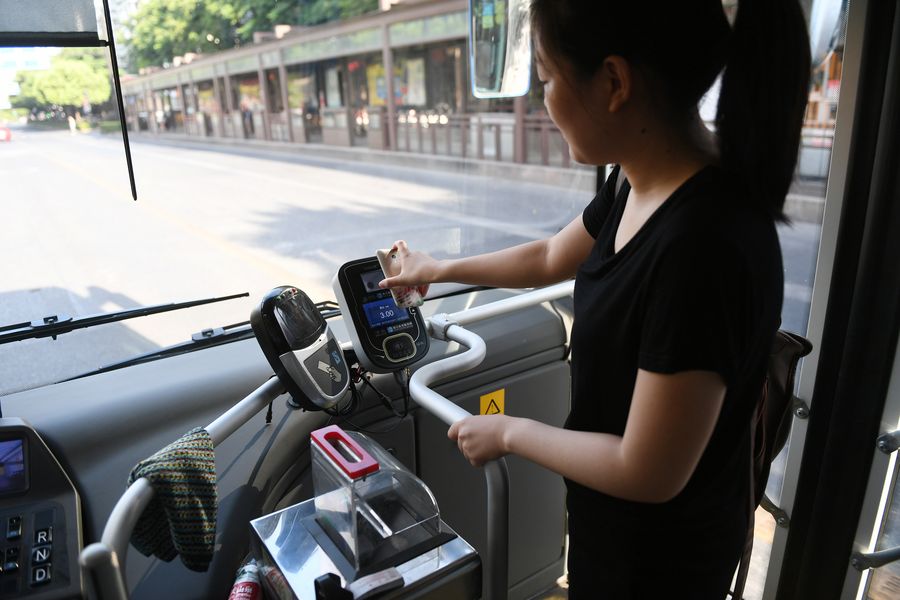

In 2020, about 74 percent of Chinese people used mobile payments every day because they’re easy and convenient, according to a survey report from the Payment & Clearing Association of China (PCAC).

A passenger scans a QR code of Alipay, a mobile payment app, to take bus in Hangzhou, capital of east China's Zhejiang Province. (Xinhua/Huang Zongzhi)
The report found that Chinese people tended to make small mobile payments last year, specifying that 38.4 percent of people paid less than 100 yuan ($15.44) per transaction through mobile payments, 23.3 percentage points higher than 2019, and 16.4 percent of people paid between 500 to 1,000 yuan per transaction through mobile payments, 18.9 percentage points lower than 2019.
The growth in the number of small payments, mainly in shops, public transportation, supermarkets and other venues closely linked with citizen's life, is a sign that mobile payments are playing an increasingly important role in offering convenience to users and boosting consumption, said Dong Ximiao, chief researcher with Merchants Union Consumer Finance Co. Ltd.
The growing popularity of mobile payments indicates the progress achieved in the infrastructure construction of mobile payments, said Sun Zhanping, a deputy executive with UnionPay.
Last year, making a payment through scanning a QR code was the most popular way of paying for things and services, while payment terminals were less used, the report showed.
63.4 percent of people are concerned about the security of mobile payments, according to the report, noting that security risks such as leakage of personal information, fake QR codes, and hackers who can access their payment accounts and take money from them were issues of top concern.
 Fire brigade in Shanghai holds group wedding
Fire brigade in Shanghai holds group wedding Tourists enjoy ice sculptures in Datan Town, north China
Tourists enjoy ice sculptures in Datan Town, north China Sunset scenery of Dayan Pagoda in Xi'an
Sunset scenery of Dayan Pagoda in Xi'an Tourists have fun at scenic spot in Nanlong Town, NW China
Tourists have fun at scenic spot in Nanlong Town, NW China Harbin attracts tourists by making best use of ice in winter
Harbin attracts tourists by making best use of ice in winter In pics: FIS Alpine Ski Women's World Cup Slalom
In pics: FIS Alpine Ski Women's World Cup Slalom Black-necked cranes rest at reservoir in Lhunzhub County, Lhasa
Black-necked cranes rest at reservoir in Lhunzhub County, Lhasa China's FAST telescope will be available to foreign scientists in April
China's FAST telescope will be available to foreign scientists in April "She power" plays indispensable role in poverty alleviation
"She power" plays indispensable role in poverty alleviation Top 10 world news events of People's Daily in 2020
Top 10 world news events of People's Daily in 2020 Top 10 China news events of People's Daily in 2020
Top 10 China news events of People's Daily in 2020 Top 10 media buzzwords of 2020
Top 10 media buzzwords of 2020 Year-ender:10 major tourism stories of 2020
Year-ender:10 major tourism stories of 2020 No interference in Venezuelan issues
No interference in Venezuelan issues
 Biz prepares for trade spat
Biz prepares for trade spat
 Broadcasting Continent
Broadcasting Continent Australia wins Chinese CEOs as US loses
Australia wins Chinese CEOs as US loses